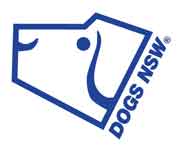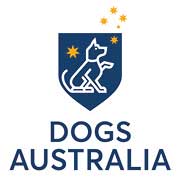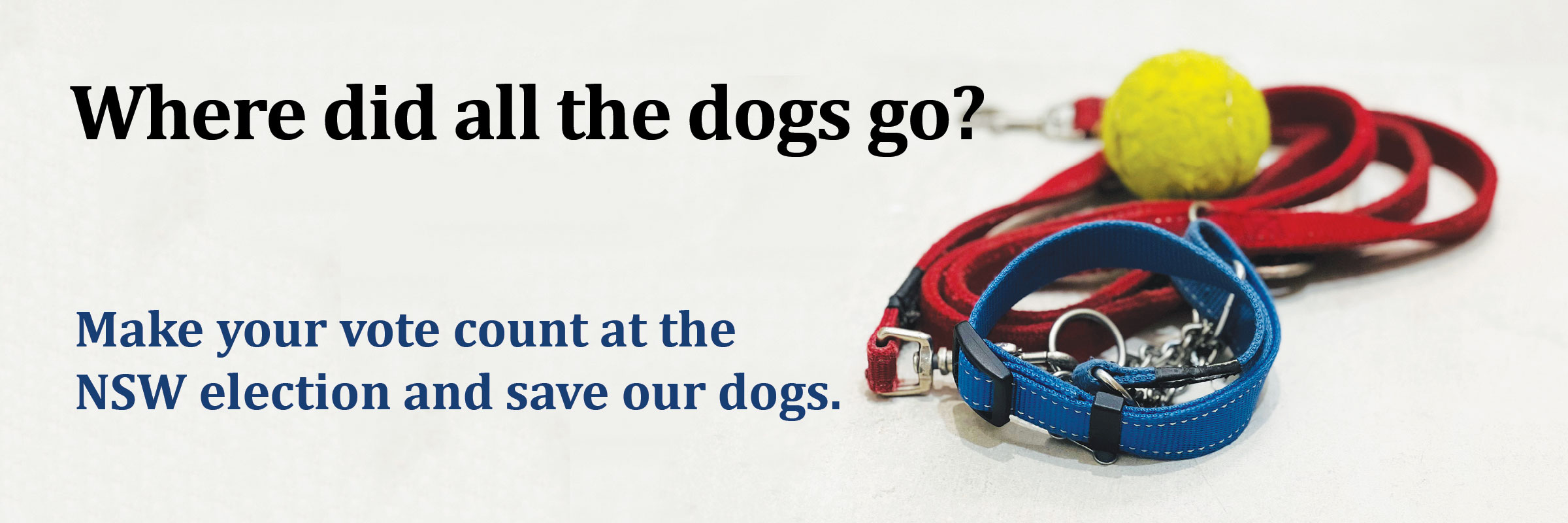News and updates

It's Election Day today so make your vote count and know all the facts!
25-03-2023As the peak body for breeders of purebred dogs in this State, DOGS NSW finds the practice of puppy farms/mills abhorrent, and we agree there should be a concerted effort to tackle it.
The Daily Telegraph’s article ‘NSW election: Emma Hurst MP, @AnimalJusticeParty call out blatant lies in antiparty campaign’ lacks research, includes misinformation and, we believe, lacks fact-checking. It also makes false statements regarding DOGS NSW, particularly the content of the NSW radio advertisements mentioned in the article, which mentions the Companions and Pets Party.
You can read the Daily Telegraph article by clicking here.
Please click here to read DOGS NSW response letter to the Daily Telegraph to correct the article.
On DOGS NSW website we have stated that the key issues with the AJP and Greens are removing legal property ownership of dogs, so you’re only their guardian, eliminating short-nosed (brachycephalic) breeds like Pugs/French Bulldogs and more; restricting breeding conditions such as the de-sexing age from 6 years, even if vet assesses healthy; dogs considered breeding animals over 8 weeks even though not breeding age (recommended 12months); not breeding dogs with genetic conditions even though DNA can rule plan breeding out conditions. These AJP policies lack scientific evidence and research and are part of their policy to promote animal adoption ahead of commercialised breeding.
DOGS NSW are against puppy farming. We love our dogs and have the highest standards of animal welfare and code of ethics.
The Animal Justice Party policies will not solve puppy farming, rather encourage them and foster black market trade with price increases for families; create a scarcity of purebred dogs for families to choose a dog based on their breed (meaning they could end up with a poorly bred dog with behavioural or health problems and increased costs). DOGS NSW only advocates on evidence based research and liaising with qualified industry professionals such as University Professors and Veterinarians.
Ultimately, dog owners and ethical registered breeders will be the collateral damage.
Vote the AJP and Greens below the line (ie, vote them last) at the NSW Election today to make your vote count to save pet ownership!
#informedvoter #nswpol #yourbreedofchoice #ownyourdog #savebrachybreeds

Update on the NSW State Election
24-03-2023One day to go before NSW votes at the election and decides about pet ownership!
Make your vote count so you keep your rights as a dog owner. Don't let political parties remove your rights and options as a dog owner.
Renowned vet and TV's Better Homes and Gardens Dr Harry Cooper agrees the Companion Animals Bill only seeks to control registered responsible breeders rather than eliminate puppy farming. He believes in one solution which is traceable identification, such as the NLIS scheme for cattle where animals are identified from birth, and while that is not a practical solution in the case of puppies, identification from 6 weeks is and they shouldn't be sold without a microchip.
"Further study of the bill makes assumptions and seeks enforcements of practices that have no scientific background that I am aware of. Show me the evidence that puppies can be selected at 8 weeks as being suitable or unsuitable breeding stock. Show me the evidence attached to the value of de-sexing male dogs at 6 years of age. Show me the evidence that ‘defects’ are genetic and therefore ‘inherited’."
Please click here to read Dr Harry's full letter.
Make sure you know who you're voting for this Saturday 25 March. Support parties who value your right to choose a dog of your choice. Unfortunately, last year the Bill passed in the upper house with the support of Labor, Greens and Animal Justice Party. Don't let it pass legislation by voting for these parties and giving them more seats in NSW Parliament. The parties which support the Bill not proceeding are Liberal, One Nation and Shooters, Fishers & Farmers Party.
DOGS NSW is dedicated to continued high standards of Animal Welfare but sadly the political policies do not solve puppy farming, rather encourage them and make dog ownership that much harder for families in NSW.
* Vote the Greens and AJP below the line (ie, vote them LAST) to make your vote count to support companion animals and the rights of dog owners.
Please forward to as many as your networks as possible or our social media posts today.![]()
![]()
 LinkedIn is newly created so please like, share and follow.
LinkedIn is newly created so please like, share and follow.

DOGS NSW Regional Grant Program
21-03-2023The DOGS NSW Finance Committee would like to advise Affiliates that the Regional Grant Program has now been finalised.
Further, the Committee would like to engage those Affiliates who were successful in their Grant Application and, subsequently received funding from the Program to send photographs of what they purchased and how those items are being used.

Dogs Australia Press Release - Survey Results Rottweiler - Juvenile Laryngeal Paralysis Polyneuropathy
21-03-2023Rottweiler - Juvenile Laryngeal Paralysis Polyneuropathy
A survey was conducted by Dogs Australia last year to ascertain the feedback from all owners of registered Rottweilers in relation to testing all breeding pairs for Juvenile Laryngeal Paralysis Polyneuropathy (JLPP).
The response received indicated support.
As this was an amendment to current regulations, the result of the survey was referred to the Dogs Australia Board of Directors for consideration at their February 2023 Special Board meeting where it was endorsed.
Consequently, the following new clause will be added to Regulations Part 6 – The Register & Registration which will be effective from 1 January 2023:
8.17 Effective from 1/1/23 ALL Rottweilers be tested for JUVENILE LARYNGEAL PARALYSIS POLYNEUROPATHY (JLPP) prior to being mated and only Clear to Clear or Clear to Carrier be permitted. The exception to this is Frozen Semen whereby a sample can be taken from left over semen when a bitch is inseminated and then sent off for testing; in these cases, the bitch must be a Clear on the chance the sire may be a Carrier. Certificate to be provided by the Laboratory carrying out testing eg: Laboklin, OFA, Orivet. Samples must be taken by a Vet or a Certified Collector.

Dogs Australia Press Release - Canine Ehrlichiosis
20-03-2023DOGS Australia has concerns regarding the risk of vectoring Canine Ehrlichiosis through the pedigree dog population attending our major exhibition events such as Royal Shows. All exhibitors are encouraged to ensure their dogs are treated for tick prevention using a reputable systemic treatment prior to attending such events or travelling into areas where the brown dog tick is known to occur.
While reputable tick preventions will stop the spread of Ehrlichiosis between dogs, it still relies on the tick biting the dog in the first place to be effective and of course it’s the biting of the dog by the tick which transmits the bacteria.
The disease is characterised by fever, decreased appetite, lethargy and bleeding (such as nose bleeds). Some dogs develop severe and rapid weight loss, swollen limbs, difficulty breathing and blindness. The illness can also affect the bone marrow, which can be fatal. Some dogs die of septicaemia, or they bleed uncontrollably which can also lead to death. Most dogs will improve from treatment with antibiotics and other supportive measures. However, some may develop a chronic infection, which usually has a terminal outcome.
People planning travel through any of the brown tick distribution areas (as shown on this link Travelling with your dog in Australia - DAFF (agriculture.gov.au) or to events where dogs from other States and Territories will be in attendance should be applying a systemic tick prevention to their animals prior to attendance. Dogs travelling through known brown tick distribution areas should also be using a Seresto Collar Seresto® Flea & Tick Collar - Official Bayer Pet Collar Site (seresto-store.com), which prevents the parasite biting the dog in the first place.

Pet Industry News: DOGS NSW warns NSW State Election could impact dog ownership
16-03-2023DOGS NSW has warned that should the Animal Justice Party (AJP) and the Greens gain extra seats in the upcoming NSW election, dog ownership could suffer.
The Companion Animals policies that the NSW AJP and Greens have issued could reduce the number of dogs available for Australians by restricting breeding and elimination of certain purebred dogs, believe DOGS NSW.
Lyn Brand, President of DOGS NSW, stated that DOGS NSW does not support puppy farms/factories nor any sub-standard conditions for any pets to live in, but their policies are not going to deter them, rather encourage them and make dog ownership that much harder for families in NSW.
“This is the time for NSW locals to make a choice and beware of the political parties such as the Greens and Animal rights groups whose policies don’t support Australian dog owners such as challenging dog ownership by removing their property status, restrict breeding and banning certain breeds such as pugs and bulldogs, thus limiting the number of dogs available to Australians, especially purebred dogs."
“They aim to have Australians purchase only rehoming dogs from animal shelters and rescue which inhibits the ability of families to select a type of dog or cat of their choice for size temperament or suitability to lifestyle.”
Last year, the Companion Animals Amendment Bill passed in the Upper House but there wasn’t enough time for it to pass in the lower house and become legislation, but if they obtain a seat in the upcoming election, this could change.
“The result will be consumers being forced online to buy pet dogs from unregulated breeders, risk being scammed out of thousands of dollars and potentially end up with a poorly bred dog with health or behavioural problems. This will be a huge incentive for unlicensed backyard operators, while ethnical registered breeders will be impacted. NSW is already the most heavily regulated state for companion animals,” said Brand.
Professor Claire Wade, University Chair of Computational Biology and Animal Genetics, said that the Companion Animals’ Bill amendments shown have no rationale in science and are discriminatory against dogs with recorded pedigrees and breeders that employ genetic testing.
“The rules would do nothing to prevent poor breeding practices in unmonitored breeding establishments. Legitimate breeding organisations already have ethical standards that support the outcomes that these poorly worded rules seek – those are the breeding together of healthy individuals, the application of sensible genetic and physical testing, and the prevention of breeding together of first-order relatives.
“We agree that all breeders should be held to the same standard, but the amendments as shown do nothing to support that. No part of the proposed Bill is either justifiable or desirable from any perspective, and particularly not from an animal welfare or animal genetic health perspective.”
DOGS NSW believe the AJP and Greens policies will create a scarcity of puppies and dogs in NSW, drive up prices, and foster the black-market trade in puppies that undermines welfare.
Instead, Brand says the government need to focus on addressing the real issue to capture non-compliant dog and cat breeders.
“We need to encourage the public to buy puppies only if they have certificates of vaccination and are microchipped. This is already mandatory in NSW when selling a puppy in this state. It’s also the policy of professional and ethical dog breeding organisations like DOGS NSW and dog rescues such as the RSPCA. Puppies aren’t legally allowed to be sold under eight weeks of age and need to be microchipped before 12 weeks and vaccinated between 6-8 weeks,” said Brand.
SAVE OUR DOGS AT THE NSW STATE ELECTION 25 MARCH 2023
07-03-2023SAVE OUR DOGS AT THE NSW STATE ELECTION 25 MARCH 2023
Where have all the dogs gone? Ask the Animal Justice Party.
The upcoming NSW State Election will affect DOGS NSW members and dog owners if the Animal Justice Party retain their seats in Parliament, given their companion animals policies.
DOGS NSW and Dogs Australia despise puppy farms. The AJP calling to amend the Companion Animals Amendment (Puppy Farm) Bill 2021 will no longer give Australians the chance to own a dog of their choice. The Bill will only further restrict heavily regulated home breeders who are registered, ethical and look after the welfare of their dogs.
The Result - less purebred dogs and the elimination of specific breeds.
AJP's Bill proposal will increase illegal puppy farms and registered ethical breeders will be collateral damage. They aim to push for dogs to only be purchased through rehoming or rescue organisations. The amendments proposed don’t address how to fix the problem of illegal puppy farms.
Make sure you know who you’re voting for in this NSW Election on March 25. Be an informed voter and fight for your right to choose a purebred dog.
HERE ARE SOME FACTS FROM PROFESSOR CLAIRE WADE
We would like to thank Professor Claire Wade for allowing DOGS NSW to reprint her professional and valued opinion regarding the Animal Justice Party Companion Animals Amendment Bill.
Below are a just a couple of the changes to companion animal breeding rules proposed:
A proprietor of a companion animal breeding business must not breed from a
female dog or cat in the following circumstances—
(a) if a heritable defect is identified in a previous litter of the dog or cat,
(b) with a dog or cat that is related to the dog or cat by blood.
Response:
The animal welfare justifications for the proposed changes are absent or unclear.
There is no scientific support for the suggested changes.
Part (a): The definition of a heritable defect is absent or unclear and There are multiple problems with this suggestion. First, the male and female parent contribute equally to the progeny and this action is discriminatory against the female. Second, heritable defect cannot be accurately defined. If a progeny with a birth defect is born, it may be caused by non-heritable factors. This requirement would be impossible to prove and enforce.
For Mendelian recessive conditions, simply breeding the animal with a partner from a different genetic background will minimize the chances of re-occurrence. Indeed, the imposition of such a requirement is far more likely to generate negative genetic outcomes from a population perspective by severely restricting the effective population size of the breeding population. This will do far more genetic harm than good. Most modern companion animal breeders actively participate in research to provide new genetic tests for Mendelian conditions where these do not already exist and actively apply genetic testing to minimize or eliminate the occurrence of Mendelian inherited defects in progeny.
For complex traits, such as orthopaedic traits or cancer, the proposed limit is unlikely to make any substantive impact on the occurrence of disorders in progeny.
Part (b): The definition of “related by blood” is unquantifiable. If this same requirement was imposed upon humans, then many cultures would be subjected to genocide.
This proposal lacks scientific rationale or merit. To begin with "related by blood" is not a scientific term and as such it has no scientific meaning. How will the degree of relationship be determined or proven in practice? This rule would be prejudiced against pedigree dogs as the pedigree relationship is visible through records. Non-pedigreed dog breeders and people using crossbreeding would be free to continue breeding close relatives together without it being obvious to the public.

SUMMARY
The amendments shown have no rationale in science. They are discriminatory against dogs with recorded pedigrees and breeders that employ genetic testing. Breaches of the rules would be impossible to prove and enforce. The rules would do nothing to prevent poor breeding practices in unmonitored breeding establishments. Legitimate breeding organisations already have ethical standards that support the outcomes that these poorly worded rules seek - those are the breeding together of healthy individuals, the application of sensible genetic and physical testing, and the prevention of breeding together of first-order relatives. We agree that all breeders should be held to the same standard, but the amendments as shown do nothing to support that.
No part of the proposed Bill is either justifiable or desirable from any perspective, and particularly not from an animal welfare or animal genetic health perspective.
*PLEASE NOTE: Members are encouraged to circulate this Special Notice as an important message, and to lobby your State members of Parliament regarding the proposed Animal Justice Party (Emma Hurst Puppy Farming Bill).
NSW STATE ELECTION - #informedvoter Campaign Update
The upcoming NSW State Election will affect DOGS NSW members and dog owners if the Australian Justice Party gain seats in Parliament, given their companion animals policies.
DOGS NSW is currently running an #informedvoter campaign as per the special notice that was sent to members last week. Pre-election, DOGS NSW goal is to encourage the general public to NOT VOTE for the AJP in the upcoming election. This is the time to make sure the public have in power the political parties to push issues of importance to them. DOGS NSW will action this communication via social media and pitching to media (TV/Radio/Print/Online) story opportunities about the issues with the Companion Animals Amendment (Puppy Farms) Bill 2021/AJP and profiling spokespersons, including DOGS NSW President, animal experts and dog breeder members.
Pre-election, the action DOGS NSW members can do (as per our communications last week) is to share the Special Notice emailed Wednesday and social media posts (#informed voter campaign) among your network of friends and family, to know who they're voting for and not to vote AJP, as it will affect your dog breeding choice and ownership.
Post-election, once a government party is elected on March 25, we will ask members to email their local MP about this issue so they cannot vote for the Bill's amendment to pass legislation. We will also pitch new media stories regarding AJP's policies should they obtain a government seat and we will include a call to action for the general public/DOGS NSW members to sign a petition.org (which we will create) to refute the Companion Animals Amendment (Puppy Farms) Bill 2021, and this will add further support when lobbying the local MP. This second stage of the campaign is post-election, once a government party is elected; that is when we will know what policies will be pushed and which political parties will align with each other on which policies. This is on the advice of a professional government lobbyist. This will be the time to take action on specific policies to target local MPs.

Approval of 2024 National Show - Border Collie Club of Qld Inc
23-02-2023Dogs Australia is pleased to advise the approval of the application received from the Border Collie Club of Queensland Inc via Dogs Queensland to conduct a National Show to be held on 30 August and 1 September 2024, as well as a Restricted to Breed Herding trial and Restricted to Breed Scent Work trial on the 29 September 2024, to be conducted at the Dogs Queensland Showgrounds, 247 King Avenue, Durack, Queensland.
Approval of 2023 National Show/Restricted Trials - Poodle Club of Victoria Inc
23-02-2023Dogs Australia is pleased to advise the approval of the application received from the Poodle Club of Victoria Inc via Dogs Victoria to conduct a National Show with a Restricted Obedience Trial to be held on 23 to 24 September 2023 at KCC Park, Skye, Victoria. The Royal Agricultural Society of Victoria has confirmed these dates will not clash with the breed judging at the 2023 Royal Melbourne Show.



